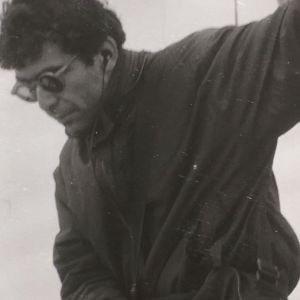I’ll share my testimony about October 5th, ’88, the 30-year anniversary. Where should I start? I think it’s best to divide the testimony into two parts. There’s a part that is the most intimate, the most personal, and another part that is more political. The personal part has more to do with my personal situation at that time. I was living with a woman who is now the mother of my oldest son, Pascual. I believe that at that moment, when the plebiscite of ’88 came and the “No” triumphed, and when the general uprising, so to speak, occurred, we mutually decided, I think, almost without needing to discuss it, that it was the right time to have children, to raise them. Perhaps to dare, let’s say, to transcend in that aspect. There was no longer fear, or rather, the fear was lifted, the barrier that each of us had in Chile at that moment, to expand the family or create a family, was removed. There was this feeling that the plebiscite and its outcome allowed each one of us to envision our lives in a more normal way than it had been until then, where the risk was always the possibility of being arrested or deported, not having the assurance that things could function properly, of being repressed, or having a child without the proper environment.
So, in a way, October 5th served as a push for that decision. On the other hand, from a political point of view, I was working at Hoy Magazine as a journalist, and I was assigned to cover the plebiscite at the Diego Portales building. It was a very, very intense day. We all knew that many things could happen, but I think there was also a sense of calm. There was a certain certainty that even if there was a negative reaction from Pinochet and the dictatorship, there wasn’t enough political support on the other side to trigger a violent reaction or a prolonged closure of the democratic process. The United States was not aligned with Pinochet’s government at all. The wounds from ’76, since the assassination of Letelier, were still very much present. Therefore, there was no international backing. The entire external situation of Chile had changed a lot compared to what it was in ’73. Argentina had recovered democracy years ago. The same happened in Uruguay. I think the same had occurred in Brazil. So, the international and even regional environment was quite different. I would say that Pinochet’s government was on the defensive when the plebiscite took place. There was, of course, a very, very latent danger of a reaction. But at the same time, no one saw that danger, or at least I didn’t see it, as something lasting. I didn’t believe or think that it could be more than a tantrum, something that could go beyond a setback or a deviation in what could be called the democratization process.
So, I didn’t feel that there was a great danger either. Nor did I feel the terrible uncertainty that we experienced a lot when the attack against Pinochet happened in ’86, right? In ’86, ’87, there was a backlash, a reaction, so to speak, from Pinochet and the fury, where many people who were openly involved in politics, journalism, and literature, but without any responsibility for the assassination attempt, were immediately targeted. But at that moment, in ’86, when the attack took place, there was indeed a lot of fear because many people actually died, others were kidnapped, and many were intimidated, creating a certain uncertainty about what could happen. So, the real scare had already happened, two or three years earlier. And then, obviously, the electoral solution to the Chilean conflict appeared as the only possible one. Because the assassination attempt had failed, the street mobilization had failed, the street protests had worn out, and there was a sense of division among the opposition regarding the violent way out. Many people and leaders realized that there was no room, and it was a kind of madness, to expect a direct armed confrontation with the Army, with the Chilean armed forces, who would undoubtedly crush any reaction of that kind.
But at the same time, the assassination attempt on Pinochet convinced many people, on the other hand, from the government and the dictatorship itself, that they had to fulfill their own itineraries. And if the “No” won, it was their responsibility to prevent it from leading to a direct violent phase in the fight against the dictatorship. So, politically, there was no space for a very violent reaction on October 5th, ’88. And on the other hand, the dictatorship itself knew that it was somewhat tied to its own itinerary. It didn’t have the support of the Americans, it didn’t have a good regional context to act violently, to repress. So, it was almost like a moment, a key and highly anticipated moment when, from within the dictatorship, some commanders, including the Air Force command, acknowledged the victory of the “No,” and any possibility of a self-coup or something similar was eliminated. So, these are two ways of looking at it, a personal perspective and a more political interpretation of what was happening.
Then there’s also the issue of Chile, let’s say the theme of joy, the slogan of joy that is already arriving, and social happiness, so to speak, reconciliation. We all knew, and immediately many people realized, that the triumph of the “No” was a necessary negotiation, so to speak, to get out of the stagnation and bottleneck where the country had found itself. So, the negotiation was going to be led by the political leadership that was chosen. But as a negotiation, it was inevitable, right? At least my understanding of that negotiation was that what had been the mobilization, so to speak, of the people to generate an alternative count, to carry out street mobilization, to activate, so to speak, the massiveness of the opposition to the Pinochet regime, was going to be demobilized. Because that was going to happen quickly. We all knew that it was also going to be a means, to some extent, of the opposition’s political leadership. And the important thing was then to ensure, ensure the transition, ensure the beginning, a transition that was going to start, let’s say, with the election of a candidate, who had to represent the entire opposition the following year, in ’89, right? because if Pinochet lost the plebiscite, then there would be elections the following year, and that’s what happened, to some extent.
That was somewhat what happened. And it was like the panorama was drawn that way. I believe that, and that also resulted in the fact that on October 5th, during the successive governments of the Transition, it wasn’t a date, so to speak, massively celebrated in the streets, but rather more like a ceremony. An institutional ceremony, right, directed by the leaders who had taken on the role of conducting the transition process. So, October 5th turned into a ceremony rather than a milestone, an anniversary, or anything like that. The effect of that was demobilization, right, a surrender, I would say, of certain guarantees to the outgoing government and a prolongation, in a way, of many of the structures and the ways, so to speak, in which the country was governed. So, it didn’t have that element, and no, it didn’t, it didn’t, it didn’t have that element of massiveness, celebration, and a sense of freedom, so to speak, that it had at the very moment of October 5th. That quickly transformed into something else. As I said, it was a milestone, a milestone in the beginning of the transition or the Transition, right, that was quickly celebrated as a ceremony. It was almost like celebrated as a ceremony, I don’t know if private, but the privatization of politics also occurred, along with the beginning of the transition, politics became privatized, right? It wasn’t something anymore, it wasn’t something massive, it wasn’t something of the social organizations, the press, it wasn’t something where, in a way, they turned into a force, but quickly it acquired a much more, I would say, closed-door and internal negotiation character between the outgoing government, right, the dictatorship that stopped occupying that omnipresent role, so to speak. And a leadership that committed itself, so to speak, to preserving certain things and negotiating with the dictatorship to set in motion a process of democratization. I think that’s the point. But, as I said, of course, we all felt that it was like, it was like,
the fact that one could say, well, now we have children, so to speak, is not a sign or a signal of how the process was privatized, right.
Perhaps many say that this is what had to be done, that this is what we expected, that we were all tired of so much mobilization, so much street violence, so much confrontation, and that a certain moment of relaxation and deferred negotiation was necessary, right, and a deferred demand over time. Well, that remains as a common, as a topic of long discussion that actually crossed, for about twenty-five years, I would say twenty years, the governments of the transition that succeeded each other in power. Until a weariness that is evident today, that there is no longer that consensus, that Chile has turned the page on that, on that process. And I don’t know if at the 30-year mark, right, from October 5th, there will be a unifying memory regarding that. It’s more like I believe that the memory and the memory at that moment are contradictory because on one hand, the restraints were loosened, people made personal decisions without the fear that existed before, and in a way, society opened up, right, and different paths were taken. But, but, but on the other hand, certain issues and a certain moment of struggle and, so to speak, common criteria to confront the dictatorship and its legacy were also covered up and closed off. Certainly, the legacy was still present. The transition began, it was inaugurated with the premise, in my opinion false and a bit crazy, that Pinochet had to be a factor of stability in that transition. Pinochet was going to be a designated senator, and if he remained as commander-in-chief, he would continue leading the Army and the Armed Forces with tremendous relevance and hegemony. So, making Pinochet a key factor of stability in the transition, in my opinion, was an absolute calamity. Well, that’s it.


